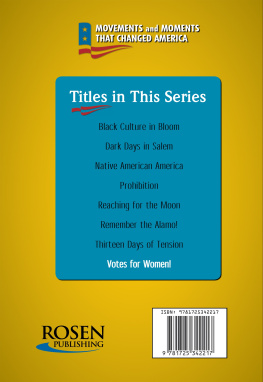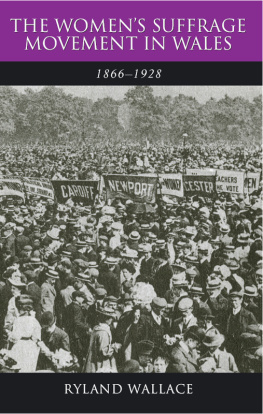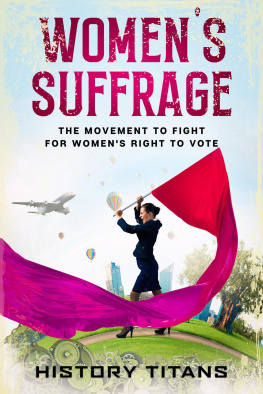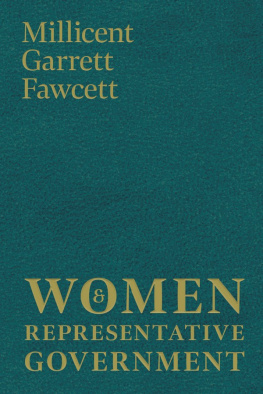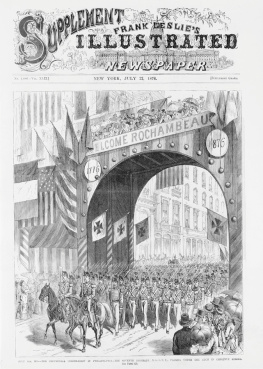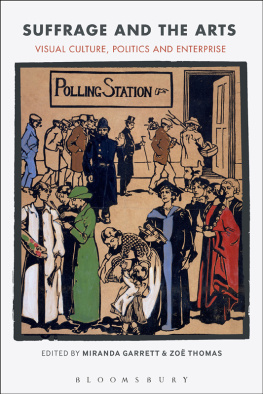Routledge Revivals
The National Union of Womens Suffrage
Societies 18971914
First published in 1981, this book traces the history of the National Union of Womens Suffrage Societies (NUWSS) from 18971914. Whereas most historians have focused on the more militant aspect of the struggle for female enfranchisement, embodied by the Womens Political and Social Union (WPSU), this work provides an essential overview of the often dismissed nonviolent and constitutional NUWSS by 1914 the largest single womens suffrage organisation. The author argues that, although a less dramatic organisation than the WPSU, the NUWSS was far more responsible for laying the pre-war groundwork for the enfranchisement of women in 1918.
The National Union of Womens
Suffrage Societies 18971914
Leslie Parker Hume
First published 1982
by Garland Publishing Inc.
This edition first published in 2016 by Routledge
2 Park Square, Milton Park, Abingdon, Oxon OX14 4RN
and by Routledge
711 Third Avenue, New York, NY 10017
Routledge is an imprint of the Taylor & Francis Group, an informa business
1982 Leslie Parker Hume
All rights reserved. No part of this book may be reprinted or reproduced or utilised in any form or by any electronic, mechanical, or other means, now known or hereafter invented, including photocopying and recording, or in any information storage or retrieval system, without permission in writing from the publishers.
Publishers Note
The publisher has gone to great lengths to ensure the quality of this reprint but points out that some imperfections in the original copies may be apparent.
Disclaimer
The publisher has made every effort to trace copyright holders and welcomes correspondence from those they have been unable to contact.
A Library of Congress record exists under LC control number: 81048371
ISBN 13: 978-1-138-66672-6 (hbk)
ISBN 13: 978-1-315-61921-7 (ebk)
ISBN 13: 978-1-138-66682-5 (pbk)
THE NATIONAL UNION
OF WOMENS SUFFRAGE SOCIETIES
18971914
Leslie Parker Hume
1982 Leslie Parker Hume
All rights reserved
Library of Congress Cataloging in Publication Data
Hume, Leslie Parker.
The National Union of Womens Suffrage Societies,
18971914.
(Modern British history; 3)
Bibliography: p.
Includes index.
1. National Union of Womens Suffrage SocietiesHistory.
2. WomenSuffrageGreat BritainHistory.
I. Title. II. Series.
JN979.H85 1982 324.62306041 81-48371
ISBN 0-8240-5167-X
All volumes in this series are printed on acid-free,
250-year-life paper.
Printed in the United States of America
Although many historians have studied the womens suffrage movement in England during the late nineteenth and early twentieth centuries, the scholarship has focused exclusively on the militant aspect of the struggle for the vote and, in particular, on the activities of the Womens Social and Political Union (WSPU). Seemingly dazzled by all the excitement and sensationalism of stone throwing, arson, and forcible feeding, historians have lost sight of the less colorful, nonviolent, constitutional suffragists of the National Union of Womens Suffrage Societies (NUWSS). The few mentions of the NUWSS have, for the most part, repeated uncritically the militants own judgments on the NUWSS and dismissed the NUWSS as an "old-fashioned and official gang" which did little to promote the cause of womens suffrage. In other words, historians have tended to treat the NUWSS as a static organization which, in 1914 as in 1897, differed very little from the suffrage organizations of the mid-Victorian period.
In fact, the NUWSS was important in its own right, and its history as related in this volume fills some of the gaps and omissions, and may dispell some of the misconceptions, which distort our present picture of the British womens suffrage movement. I hope that the history will provide a more complete understanding of the complexity of issues, personalities, and organizations that characterized the struggle for votes for women. The NUWSS, which by 1914 had over 50,000 adherents, was the single largest organization for the promotion of womens suffrage in Britain. Although in some ways the NUWSS was, in comparison with the WSPU, a less dramatic organization, much influenced by its Victorian heritage, it was, far more than its militant counterpart, responsible for laying the groundwork for the enactment of womens suffrage; the enfranchisement of women in 1918 was in large part the fruit of the prewar labors of the NUWSS.
Many persons have helped me in the research and writing of this book, and I should like to thank them here. In the early days of the project, Mildred Surrey and Rosemary Collier of the Fawcett Society, and Jean Ayton, Archivist of the Manchester Public Library, were of invaluable assistance in locating materials on the NUWSS. Andrew Rosen, Penny Kanner, and Margaret Barrow kindly shared their knowledge of archival sources and suffrage collections with me. On this side of the Atlantic, James Knox and David Rozkuszka of the Stanford University Libraries took great pains to help locate materials and proved endlessly patient in answering my queries.
I am indebted to Shirley Taylor for bringing her editorial skills to bear on the manuscript. I should also like to express my gratitude to Peter Stansky who, both as advisor and editor, was unfailingly enthusiastic about this study; his criticisms and encouragement aided me in every stage of the research and writing of the book. Finally, I should like to thank George Hume, who lived with the NUWSS for many years, and managed always to show interest in and support for this seemingly endless project.
L.P.H.
Stanford, California
8 June 1982
The formation of the National Union of Womens Suffrage Societies on October 14, 1897, and the first nine years of the NUWSS activity were not so much the start of a new phase in the womens suffrage movement in England as they were the ending of the first long phase which began in the mid860s. Although there had been occasional voices crying in the wilderness for votes for women before the 1860s, nothing that could be termed a movement for womens suffrage existed before 1866. These small groups of feminists seemed to believe that these practical reforms would lay the groundwork for the ultimate political enfranchisement of women and that in comparison with these much needed reforms, the vote was of secondary importance and largely of symbolic value.
One may speculate that the feminists refrained from embarking on a drive for the vote because they realized how controversial and explosive such a demand would be. Though many feminists were frank in their criticism of the status quo, they were quite aware of the heavy it was as Tennyson defined it in The Princess (1847):
Man for the field and woman for the hearth;
Man for the sword, and for the needle she;
Man with the head, and woman with the heart;
Man to command, and woman to obey;
All else confusion.
[pt. V, 11. 43741]
Obviously, the political enfranchisement of women presaged the confusion of male and female roles, not only in its assumption that women had public duties and a political capacity, not just private duties and a domestic capacity, but also in its implied challenge of the notion of women as subordinates. The early feminists were quite aware of what the vote implied for relationships within the family, particularly for patriarchal authority; indeed, a re-ordering was what they were after, as they occasionally felt free to say. Lydia Becker, the most prominent figure in the early womens suffrage movement, expressed this idea frankly: I think that the notion that the husband ought to have headship or authority over his wife, is the root of all social evils. Husband and wife should be coordinate and co-equal, each owing to the other entire personal service and devotion, their obligations being strictly reciprocal and mutual. In a happy marriage there is no question of obedience or which shall be paramount!


